Article by Jakob Biazza, Daniel Drepper, Sebastian Erb, Laura Hertreiter, Lena Kampf, and Ralf Wiegand, June 2, 2023 (Süddeutsche Zeitung), https://archive.ph/cFhNF [10/25/2023].
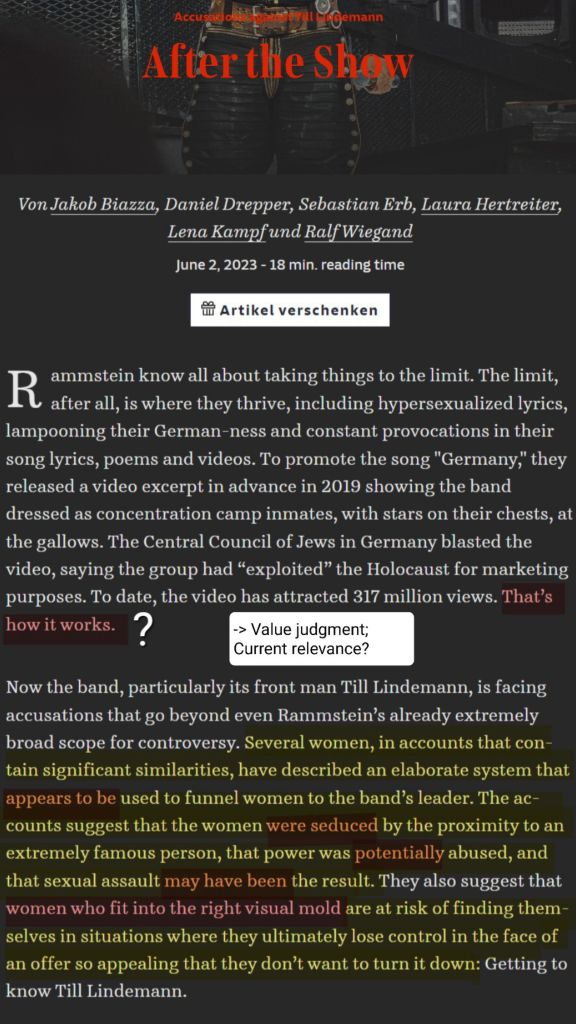
Already the introduction is interpretative and speculative (-> „appears to be“, „potentially“, „may have been“).
That there are women whose subjective perception and experiences allow the interpretative conclusion of a „system“ is possible. That there are numerous women whose subjective perceptions and experiences do not permit this conclusion for good reasons and who were dismissed during the research for this article is a fact.
In addition, the chosen wordings already draw a sharply criticizable image of women at the outset, which can be characterized at this point as fundamentally passive and easily influenced (-> „were secuted“). This can be seen as part of a specific narrative that runs through the entire report.
There is no reference to a „right visual mold“ (which, by the way, is not described in detail in the text and thus completely eludes verification), according to which women were „selected“. The diversity among us adult women and our individual physical characteristics was manifold.
This speculation, highlighted by yellow, is informed by the specific image of women conveyed to readers about us. Clichéd female timidity, weakness of character, and helplessness are implied. On the other hand, there is no mention of the fact that there was regularly a great sense of community among us women, that we always took care of each other, and that there were always security personnel in the immediate vicinity at the parties (and in „Row Zero“), which counteracted situations of insecurity and a possible loss of control by individuals in advance.
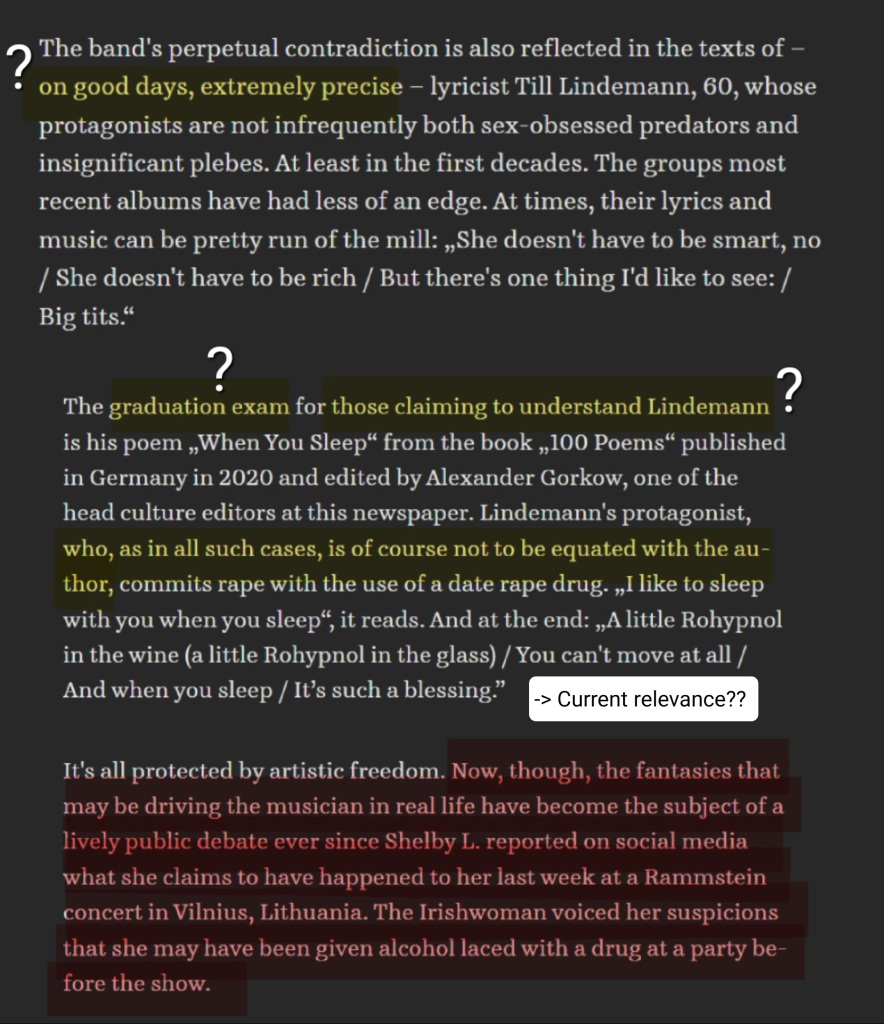
There is no evidence, circumstantial evidence, or even hints that knockout drops or similar drugs were ever administered at Rammstein or Lindemann parties. The frequently repeated reference to the poem „When You Sleep“ is nevertheless intended to provide readers with a conceivable connection to Lynn’s conjecture. The ethical legitimacy in the context of suspicion reporting of creating such connections without any real relationship to one another is questionable. In particular, since terms that are to be understood ironically, such as „graduation exam“ are used in the same passage as the accurate and (hopefully) serious reference that the lyrical I in a poem is not to be equated with the authoring person.
In general, some formulations and text sections irrelevant to the current topic clearly limit the objectivity and neutrality of the article. However, factual, distanced reporting is essential for reporting on suspicions.
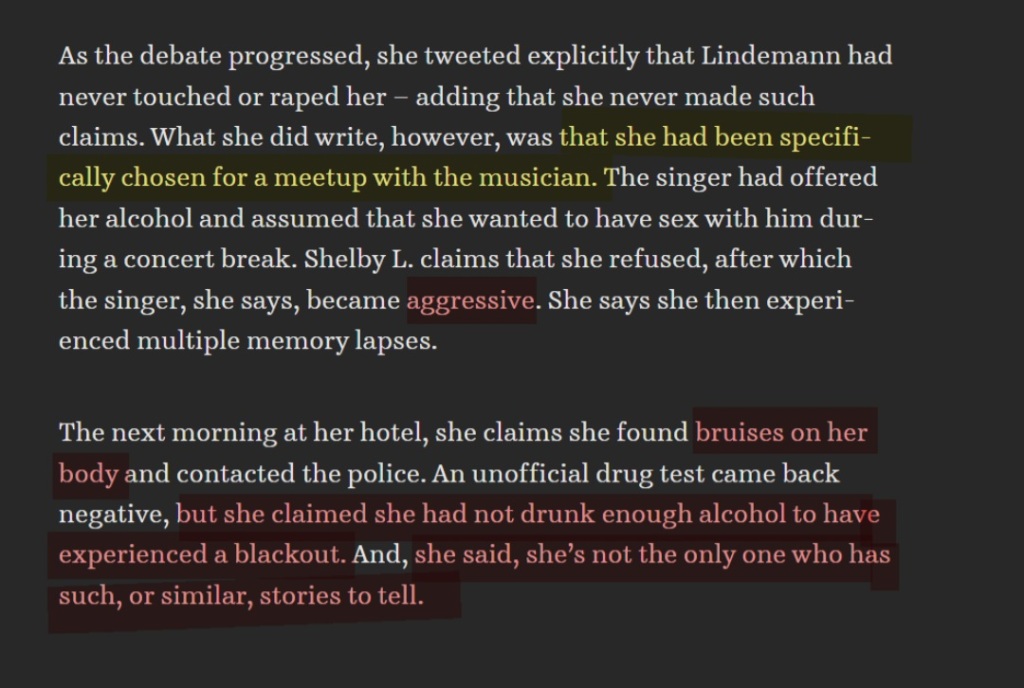
The sentence highlighted in yellow is at least misleading. According to Shelby Lynn’s own statements, she first contacted Alëna Makeeva and wrote to her via Instagram. „Specifically chosen“ is therefore also inaccurate in this context.
It remains questionable why, although reference is made here to the bruises, no reference can be found in the editor’s notes to the forensic medical report, which sees the bruises with a high degree of probability in no connection with external influence. Incomprehensibly, reports on the statements of several women who spent the evening with Lynn are also missing here and question essential parts of their descriptions as well as possible alternative explanations that could be responsible for symptoms such as memory loss, nausea and headaches. Finally, however, the criteria of legitimate suspicion reporting include reporting on the facts and arguments presented in defense of the accused.
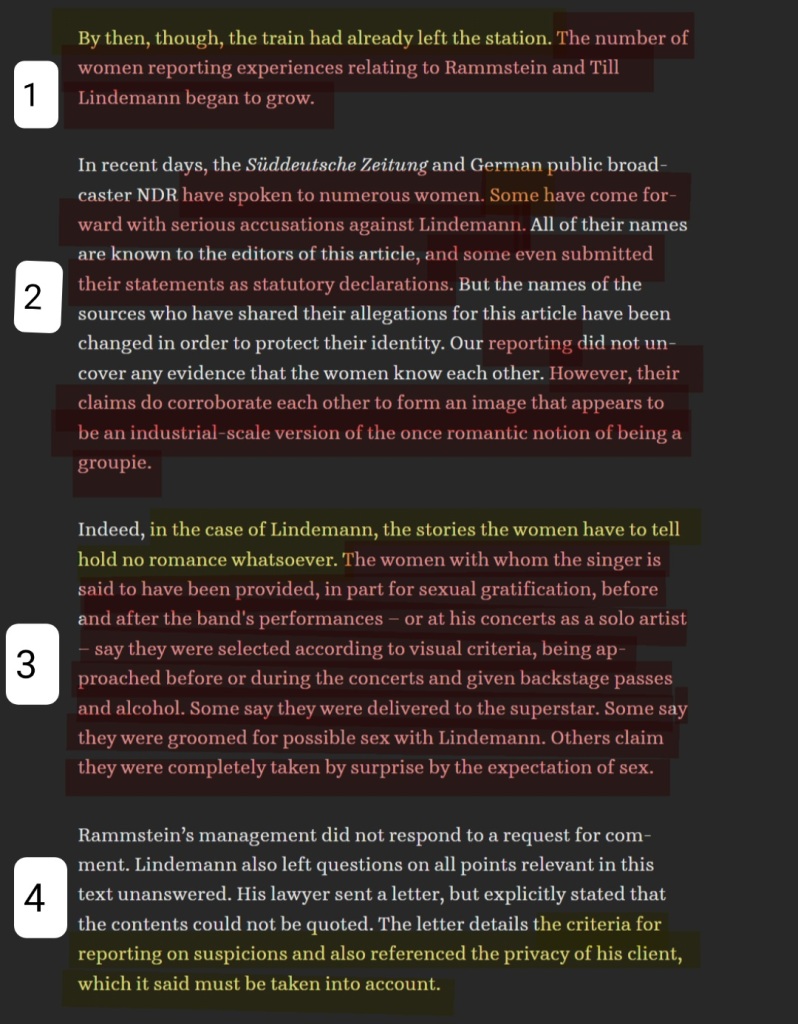
Re 1: This section could imply that Rammstein or Till Lindemann would have liked to prevent testimonials from being shared. The testimonials are not described in more detail (-> positive, negative, neutral?), but the introductory remark subliminally conveys a negative connotation. Writing this way is extremely manipulative, considering the hundreds of purely positive testimonials that have been shared online and the many failed attempts by us women to make ourselves heard by journalists as well.
Re 2:
- The inaccurate quantity specification „numerous“ conceals the fact that, in addition, significantly more women were rejected for the research for this article, provided that their experiences were positive.
- „Serious accusations“ describes a valuation without making clear whether this is meant legally or morally.
- It may be disputed to what extent the reference that some women have assured their statements as „statutory declarations“ is relevant at all in view of the fact that the identities of the women who have reported have remained unknown even to the public prosecutor’s office until today. Legal consequences for the women in case of a possible false affirmation in lieu of an oath (§ 156 StGB) thus remain excluded. Some women were apparently nevertheless unwilling to affirm their statements as statutory declarations.
Re 3:
- „The stories“ is generalizing and thus simply wrong, since numerous descriptions, provided that a few of the positive experience reports were at least read, although without printing them, can very well allow the value judgment „romance“.
- Here again, we sharply criticize the journalists‘ contemptuous language, which degrades us women to nothing more than sex objects with which one can „provide“ someone.
- Once again we reject the accusation that we were selected according to „visual criteria“ (see criticism above).
- The speculative language manipulates the reader in such a way that their focus is drawn to potential sexual acts, while at the same time creating the image of passive, naïve, and timid girls who have been given alcohol and „have been provided, in part for sexual gratification,“ to another person. Such a portrayal about us is presumptuous and misogynistic. All the more important to emphasize at this point: Sexual acts were never in the foreground at any time and were never a prerequisite for continuing to be invited. Nor were we ever urged or persuaded to consume alcohol.
Re 4: On the basis of the criticisms already formulated and those still to follow, it is obvious that these references were important, but little attention was paid to them.
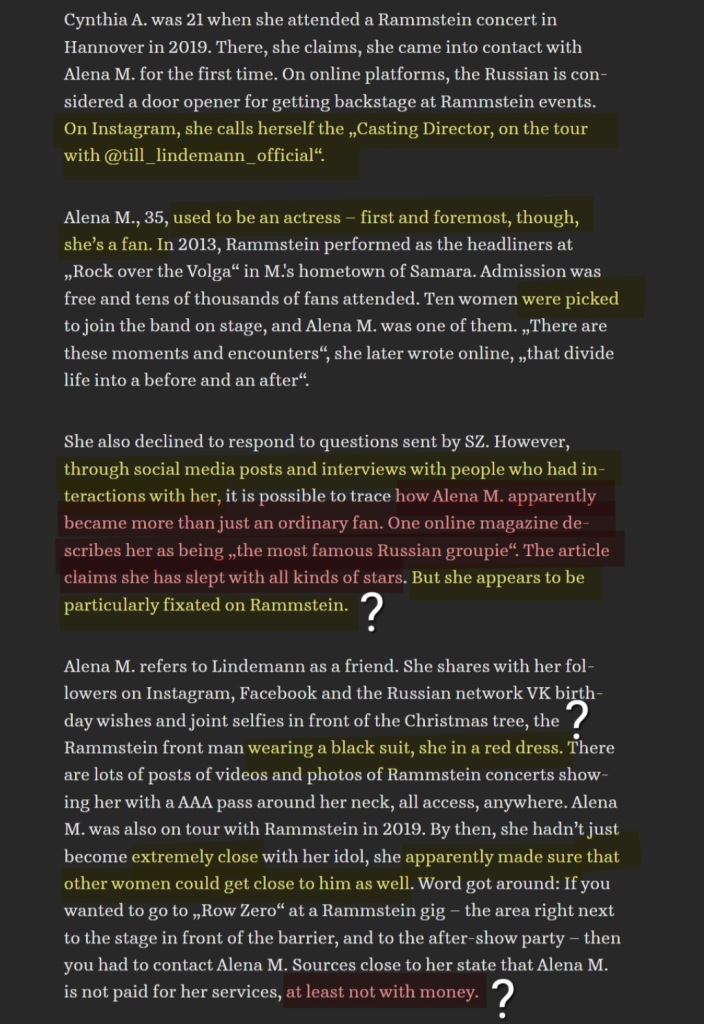
It is shocking that the research turned out to be so sloppy and flawed that it apparently did not become apparent to the journalists involved in this article that Alëna Makeeva has already been a casting director for Till Lindemann’s music videos for several years, which justifies this title. It does, however, explain how the rumor of a „casting system“ for „Row Zero“ and/or the pre- and after-show parties could arise in the first place. Through gross negligence, a connection between this title and Makeeva’s commitment regarding the holistic „Row Zero“ experience was thus presented to the world.
The coverage of Makeeva, by the way, is defamatory; after all, it is almost invariably limited to her sex life, in a way that constitutes slutshaming. The sources cited in the first three paragraphs remain vague, and no further details are given. Subsequently, speculative allusions are made in relation to Rammstein and Till Lindemann, in order to facilitate a sexual interpretation for the reader, without naming them directly and thus not making a false statement of fact. This creates a subliminal image that almost makes Makeeva look like a „pimp“, which is offensive and wrong towards her and us women.

The entire paragraph insinuates „the offensive“ (generalized as „Rammstein fans“ and nobody else referred to) an unreflective thinking and approach (-> „immediately went on the offensive“), whereby the latter does not provide any arguments, but accepts Lynn’s report, but nevertheless trivializes it. The article thus undermines the justified doubts and criticisms of Lynn’s accounts and further actions (see above; we also refer to the open letter on this website for more details on this) and generally also ignores all those people who merely refer to reason-based fundamental principles, such as that guilt and not innocence must be proven in a democratic constitutional state.
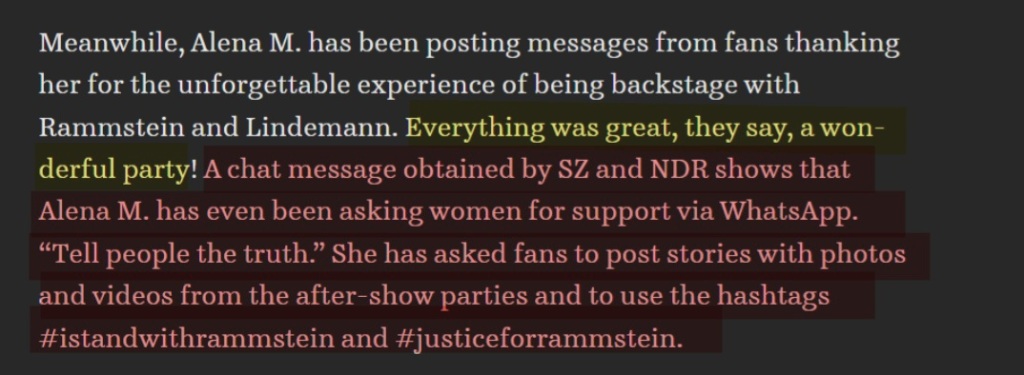
Not only are the hundreds of testimonials, some of which go on for pages, reduced to „everything was great, they say, a wonderful party,“ but even that is attempted to be belittled by pointing out that Makeeva shared a corresponding request via WhatsApp. By the way, the emphasis in the chat message is on „truth“. It may surprise the journalists of this article, but just because a woman is asked for her cooperation does not mean that she is so alienated or submissive that she blindly and automatically complies. The more than 100 signatures collected for our open letter (as of October 24, 2023) alone should be proof enough that we women have written and published our statements in a self-determined manner and still stand by them.
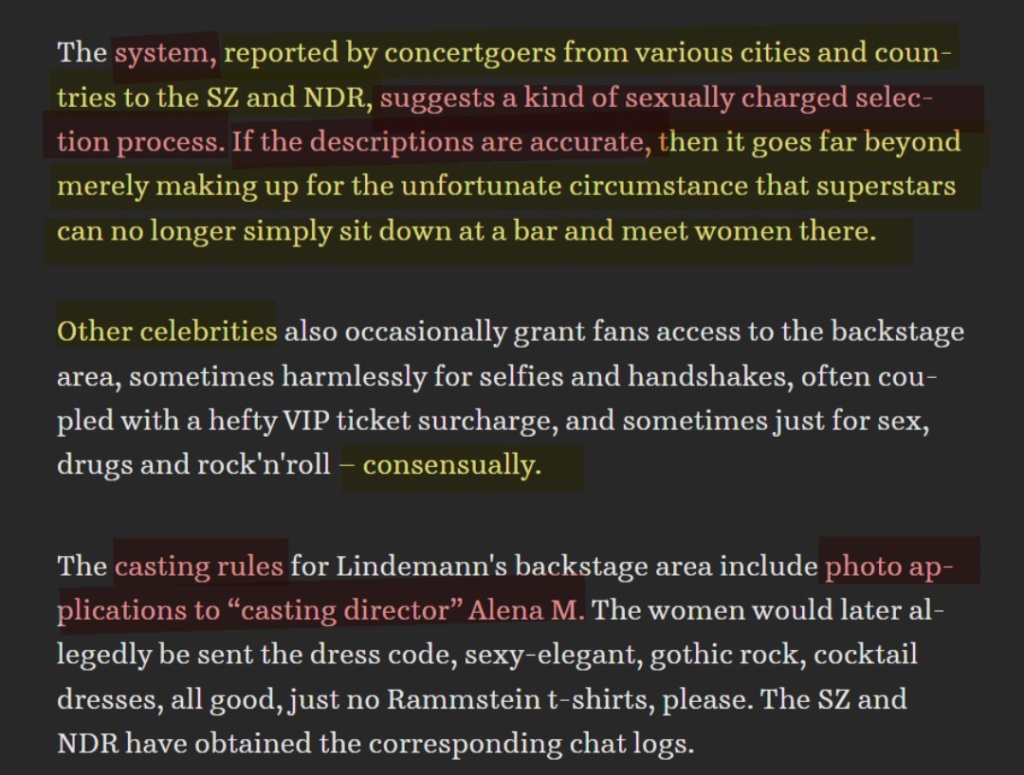
There was and still is no „system“. The narrative presented here may suggest this, but it still does not depict reality. It is repetitive, but again important at this point: sexual acts were never in the foreground at any time and were never a prerequisite for continuing to be invited.
The emphasis on „consensually“ in the description of the actions of „other celebrities“ could be interpreted as highlighting a possible difference, which could represent or facilitate a prejudgement.
There was and still is no „casting“ and accordingly no „casting rules“. How such an idea could arise in the first place has already been discussed (see above). Accordingly, it is equally impossible to speak of „photo applications“. For an evaluation of the „dress code“, please refer to our open letter.

So, although it is made clear here that the recipient and purpose are unknown, other parts of the article speculated baselessly that these could be useful for a possible sexual recruitment or could be a component of a sexually motivated casting system as a „photo application“.
Furthermore, the article should have been clearer about which chat messages from whom to whom exactly. The German article also contains the additional reference to „memory reports“ at this point. Why this reference is missing in the English version raises questions.
- The sentence „Keep cell phone? Sorry, you have to go“ is wrong! There was a separate area at the pre- and after-show parties where cell phones were kept in a clearly visible place, which in our estimation served to protect Lindemann’s privacy as well as that of us guests. There was always the possibility to use the cell phones outside of this area without any problems (!) without any restrictions.
- To our knowledge, there was never a case where a woman was told that if she didn’t change her clothes, she would have to leave. The dress code was always very variable and it was important to us that we felt comfortable in our clothes.
- In principle, it was also possible to come with a friend (whether the word „friend“ is meant in a gender-specific way is not completely clear).
- We were never pushed or coaxed into drinking alcohol (or any other drug use). Sufficient water and soft drinks were always provided.
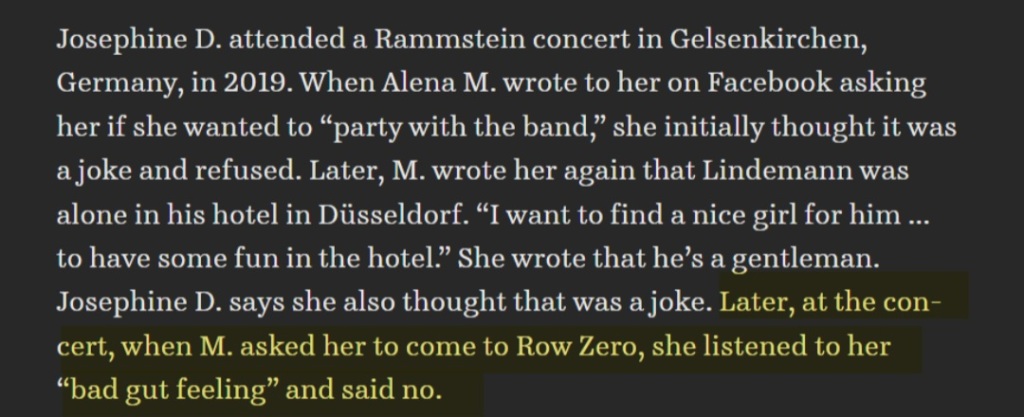
Why numerous women who have been to „Row Zero“ or backstage several times and wanted to share their positive experiences were turned away during the research for this article, but why the statements of this woman (who cannot even be called an experience report for lack of her own experience) were even printed, is inexplicable and incomprehensible to us. Her descriptions do not contain any legally relevant accusation. For comparison, here is a from German to English translated exemplary message from a woman who was turned away:
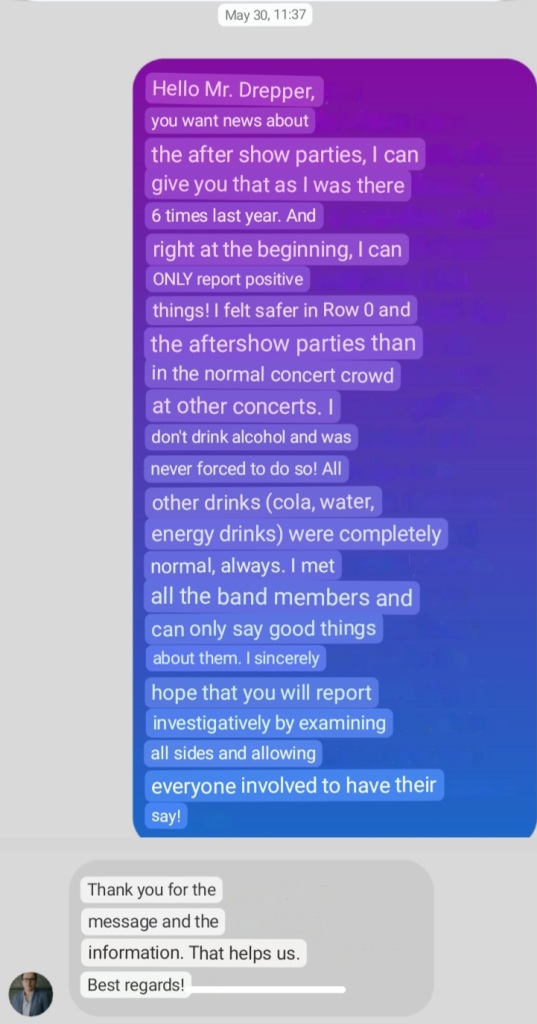
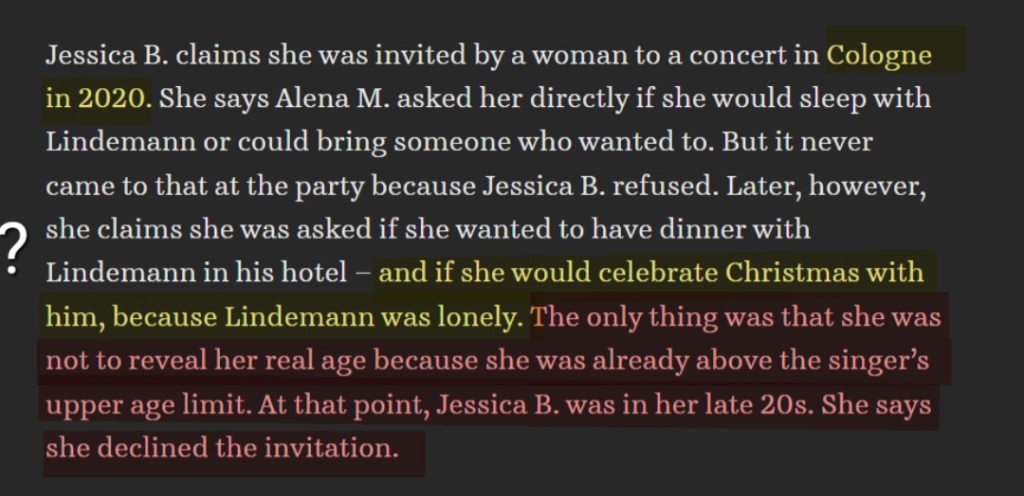
The Lindemann concert in Cologne was on February 06, 2020. The question whether Jessica B. would celebrate Christmas with Lindemann (i.e. a celebration in December) is accordingly irritating, but is not further questioned.
Her descriptions do not contain any legally relevant accusation.
It remains to be seen whether Makeeva actually made this comment regarding age. However, it would not have taken a great deal of research to quickly become certain that Lindemann’s „upper age limit“ was not exceeded at „late 20s“ and should have been added at this point. A strong bias and a weak interest in fairness and neutrality on the part of the authors of the article is once again evident.
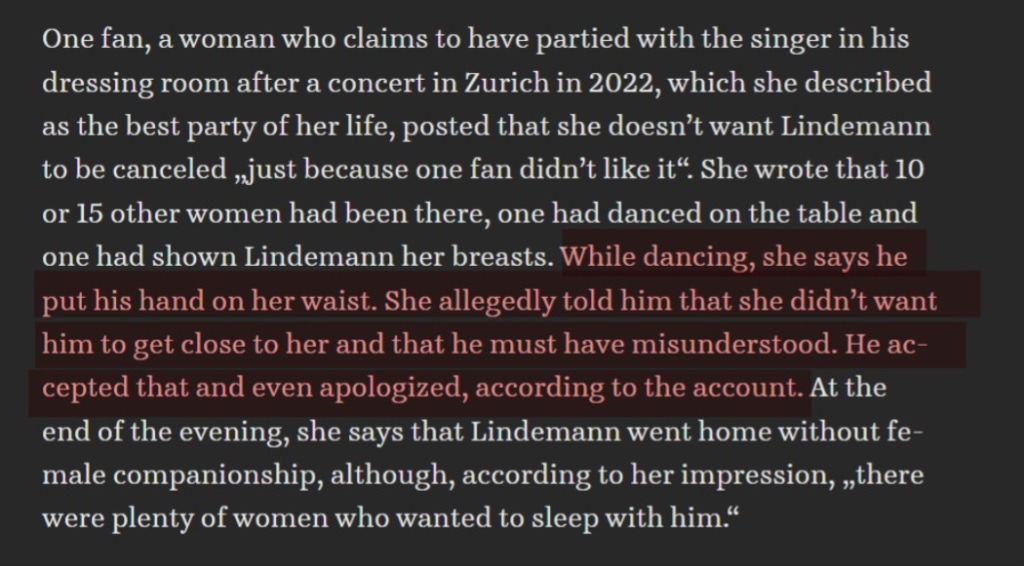
This can be seen as the only positive experience report in this article. But also here the way it was reproduced is worthy of criticism. The part that describes the party in more detail and the one that describes a touch of Lindemann’s is, contrary to other statements of the woman who remained nameless as the only one, not reproduced verbatim, but summarized in indirect speech. The first two sentences marked in red are particularly distinctive for the reader because of the narrative described, which makes a positive evaluation of this report of experience even a little more difficult.
Her descriptions do not contain any legally relevant accusations.
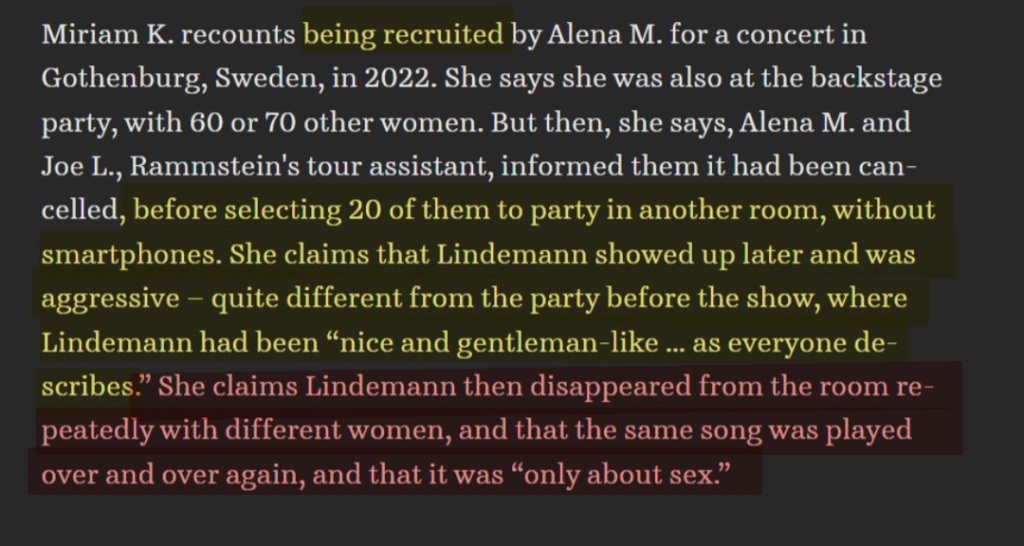
We were not „recruited“. A statement has already been made about cell phones (see above).
The word „aggressive“ should have been explained (-> verbal, mimic, gestural or physical, against objects or against people?). It is tried to undermine statements of other women who describe Lindemann „gentleman-like“ or similar by imputing another, „aggressive“ side to Lindemann à la Dr. Jekyll and Mister Hyde.
Here, too, it should be subliminally conveyed to the readers that Lindemann had sexual contact with the women, not for nothing is reference made to the song „only about sex“. Nevertheless, nothing more than pure speculation.
Her descriptions do not contain any legally relevant accusation.
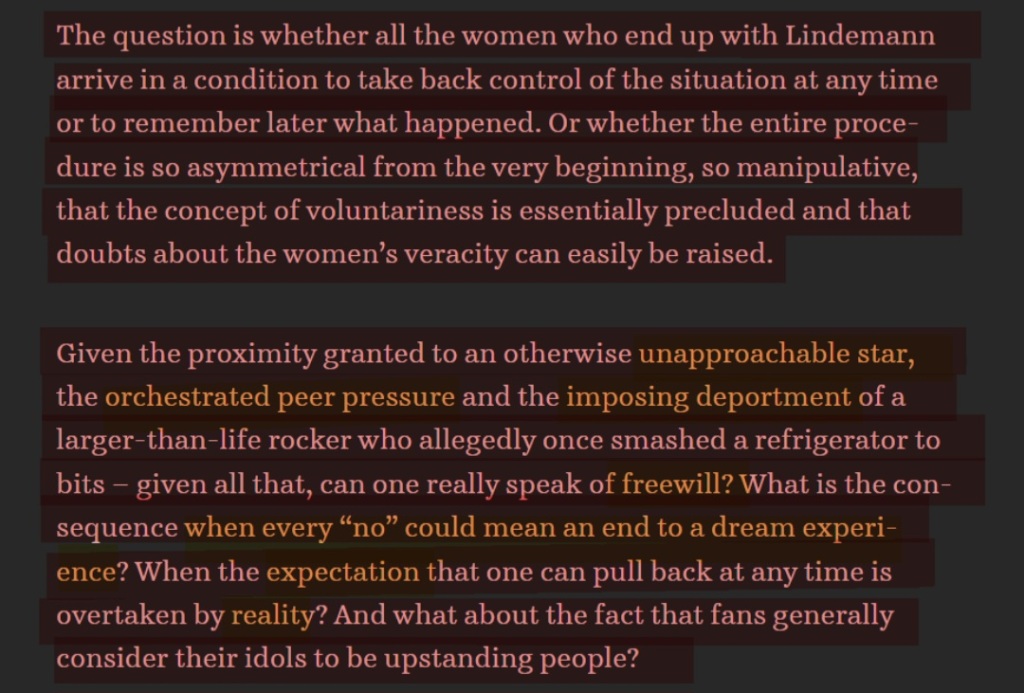
The two passages were generally written in a purely speculative and manipulative manner. „Take back control“, for example, presupposes having lost it before.
We women should be the first to be allowed to comment on an assessment regarding „Row Zero“, the parties or the interactions with Lindemann in general: Till Lindemann was polite, respectful and not at all pushy or brash towards us at all times. In our experience, Lindemann places great value on consensus in any interaction with him. Also, in our opinion, his behavior and the general conditions around „Row Zero“ were always kept in such a way that an eye-level encounter took place between him and us women. For example, the focus of the dress code was that no merch should be worn, also to avoid the mood of a meet and greet between artist and fan. Whether a distance between the latter can ever be completely bridged may remain debatable, but we want to emphasize that Lindemann never exploited his status for his own benefits. Accordingly, we are firmly convinced that there can be no talk of abuse of power! Sexual acts were never in the foreground at any time and were never a prerequisite for continuing to be invited. Lindemann also does not appear „unapproachable“ in interactions with him and also an „imposing deportment“ can not be said to him in our opinion.
What exactly is meant by „orchestrated peer pressure“? Among us women, as already mentioned, there was regularly a great sense of community, people basically paid attention to each other and deep friendships developed among each other.
Denials or refusals generally did not result in any negative consequences. One was nevertheless still invited.

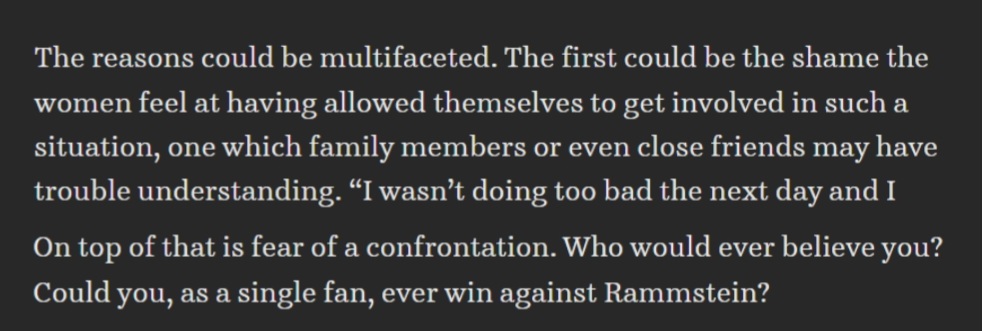
The comments made by the journalists here are, on the one hand, a legal assessment that the experiences described (and even not described) are certainly legally relevant and, on the other hand, one-sided speculations that are entirely in line with the narrative presented as to why no charges were ever filed with the police. Incidentally, not until today, despite great media and social support, both immaterial and financial.

The article ends with a concluding remark that neither refers to the presumption of innocence nor is otherwise at least neutrally written, but is prejudicial.
Regarding the described testimonies of Kaya R. and Cynthia A., we quote from the press release of Schertz Bergmann Rechtsanwälte dated 11.08.2023 against Süddeutsche Zeitung and NDR (www.tagesschau.de): In a temporary injunction issued by the Hamburg Regional Court on August 10, 2023 (Case No. 324 O 273/23), the station was prohibited from arousing the suspicion that Till Lindemann had engaged in sexual acts with the two women named „Cynthia A.“ and „Kaya R.“ in the article at issue, to which they had not consented.In this case, too, the court based its decision on the lack of a sufficient minimum set of evidentiary facts for suspicious reporting. As far as the descriptions of „Cynthia A.“ were concerned, this already applied because she had expressly stated in her affidavit that she had consented to sex with the applicant. With regard to „Kaya R.“, the affidavit was not sufficient to raise the suspicion that sexual acts had taken place without her consent. The weight of the affidavit was already limited by the fact that the witness stated that her memories were incomplete. Due to the admitted gaps in memory, the report alone does not support the serious suspicion that there was no consent to sex. This was all the more true because the report did not mention the existence of the memory gaps, so that readers could not form an accurate picture of the weight of the suspicion.There were no further indications that could speak in favor of the suspicion aroused. They also did not result from the affidavits of the editors. Large parts of the accusations made by the two women are also covered by the court’s prohibition.1
The criticism of the article „At the end of the show“ and the working methods of the journalists involved in it is extensive, but not conclusive.
- https://www.presseportal.de/pm/62754/5578607 [24.10.2023] (press release in German) ↩︎
Du muss angemeldet sein, um einen Kommentar zu veröffentlichen.